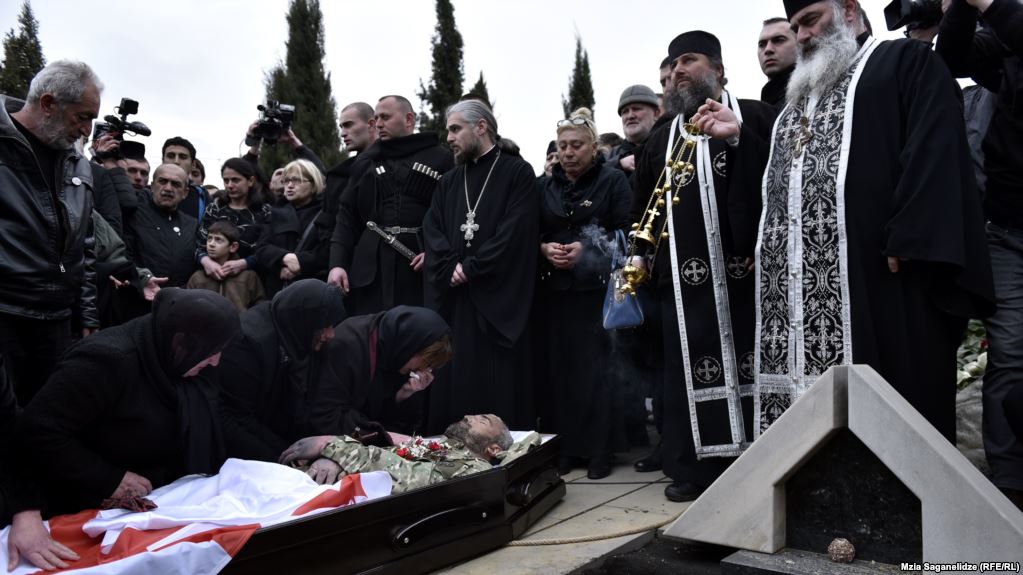Tatunashvili family to take Russia to European Court of Human Rights

The results of the primary examination of the body of Archil Tatunashvili, who died on 22 February under unclear circumstances in Tskhinvali, have been made public today.
According to a report prepared by Georgia’s National Bureau of Forensic Expertise, Tatunashvili sustained over 100 injuries.
The conclusion, drawn up by experts, has forced the investigation to be re-classified. It was originally conducted under articles “Illegal Deprivation of Liberty” and “Murder”. However, “Torture” has now been added to that list, Deputy Interior Minister Natia Mezvrishvili said in a meeting with the media.
“In fact, the body shows signs of torture. Accordingly, if the investigation classified the incident as ‘unlawful deprivation of liberty’ and ‘murder’, it should now also include torture. Now the investigation will work from this angle. We work in all directions, including intensive cooperation with the family of the deceased,” Natia Mezvrishvili said.
The report mentioned that 46 injuries were caused by the ‘repeated use of flat objects with cylindrical edges’, all of them inflicted while he was still alive. However, the report does not specify any one injury as being fatal.
The family of the deceased has several qualms with the report. According to them, some injuries were not mentioned at all. They demand another examination to be carried out by a committee which should include all injuries and identify the cause of death. After that, the Tatunashvili family plans to file a lawsuit against Russia with the European Court of Human Rights.
“It is also necessary that cardiologists and neurosurgeons are involved. They could, possibly, accurately indicate that the cause of death was torture,” Givi Tatunashvili, the father of the deceased, said in an interview with Radio Liberty.
According to him, the current examination does not address injuries which had deformed the deceased’s nose or left a mark on his forehead.
“I have been told that it is not a bullet wound on his forehead. Then let them explain what kind of wound it is. And his nose does not look like his nose,” says Givi Tatunashvili.
The Minister of State for Reconciliation and Civil Equality, Ketevan Tsihelashvili, commented on the matter:
“The conclusion of the examination confirms that the treatment of Tatunashvili was inhumane,” she said.
Tsihelashvili believes that, if necessary, international experts should be involved in the case. According to her, the Tatunashvili case is one of the main issues on the agenda for the meeting in Ergneti on 7 June.
“Tomorrow a regular meeting will be held in Ergneti on the prevention of incidents and mechanisms of response. The most important issue to be discussed is the Tatunashvili case. At the previous meeting, the Georgian delegation devoted several hours to the details of this case and to obtaining information necessary for an investigation and to identify the persons responsible for the incident. We will continue on this topic tomorrow and I can confidently say that the Georgian side will advance the investigation,” Ketevan Tsikhelashvili said.
Citizens of Georgia Archil Tatunashvili, Levan Ktashvili and Ioseb Pavliashvili were detained on 22 February 2018 by representatives of the de facto authorities of South Ossetia. The next day in Tskhinvali, 35-year-old Tatunashvili died under unclear circumstances in Tskhinvali prison. The Ossetian side announced that Archil Tatunashvili ‘fell down stairs at the Tskhinvali detention centre on the night of 23 February, and died of heart failure in Tskhinvali hospital.”
This version of events has convinced neither Tbilisi nor Tatunashvili’s family. Suspicions by the Georgian side that Tatunashvili was a victim of abuse were reinforced by the fact that the Ossetian side refused to transfer the body of the deceased for almost a month.
Tskhinvali did eventually hand over the body to Georgia on 20 March. JAMnews was the first media platform which extracted and disclosed information regarding the body being transferred to the Georgian side while missing a heart and brain.
According to lawyer Tamar Avaliani it is impossible to establish the exact cause of Tatunashvili’s death from the medical report, therefore it is necessary to conduct a committee examination within a reasonable timeframe. Tamar Avaliani stressed that the medical examination concerned only the injuries found on Tatunashvili’s body.



















